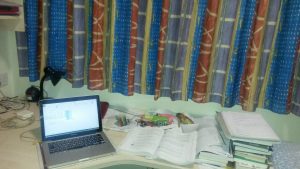On the 21st of September 2016, I marked one year at the University of Bristol. People have compared the first year of a PhD programme to the “honeymoon phase” after a wedding. Since I have never been on a honeymoon, I cannot relate to that metaphor. I can however assure you that it has been an amazing academic year with huge learning experiences for me. I like to think that I have become smarter than I was a year ago. You have to take my word for it though. My research proposal has also gone through some changes, a process similar to the metamorphosis of a butterfly. However, it doesn’t look as pretty as a butterfly yet, but I hope it will, in the coming months. The research problem that intrigued me hasn’t changed yet. I am only changing the ways I wish to address the problem. These changes have been necessitated by the need to clarify the focus of my research and fine-tune the research process. During this period, I attended several seminars, workshops and conferences, in addition to my compulsory coursework units. I can attest to the fact that all of these platforms equipped me with vital skills for doing research. Particularly, there was one seminar organized by the Bristol Doctoral College (BDC) for Postgraduate Researchers (PGRs), which literally changed my PhD life. It was held sometime in February 2016 and made significant impact on my attitude towards the PhD. They called it the ‘Seven Secrets of Highly Successful Researchers’ seminar with Hugh Kearns.
I will not give away too many details about the seminar, so that I do not ruin the experience for those who might be attending the next one. I will instead talk about the three important lessons I took away from the seminar. The first was to treat the PhD like a job, because it is a job. Prior to that time, I viewed the PhD programme as my ‘last’ schooling endeavor. I had resigned from my ‘job’ to go to ‘school’. That demarcating line meant I could afford some luxuries like procrastination and distractions. As a full-time student, it also meant that I was in full control of how I spent my flexible time. Of course, I was busy with lectures, pre-readings, assessments and preparations for supervision meetings, but most of it happened within a schedule that was subject to my whims. To treat my PhD as a job I had to have regular working hours and specific targets with deadlines. I had to be responsible with how I spent my time and self. I had to be accountable to the PhD because it was my new Boss. It put money in my account and paid my bills literally, courtesy of my scholarship. Would I spend all day browsing the social media around a Boss, in an organization where I was an employee? Would I still be in bed by 9am when that organization’s resumption time is 8am? Would I just decide to stay off work without a legitimate reason like ill-health? I definitely would not. To treat the PhD as a job, my ways had to change — and they did, gradually. Today, I am doing my best to please my Boss and show this Boss that I deserve to be here. Treating my PhD as a job has engendered in me a high sense of responsibility and accountability for what I must do per time.

The second lesson for me was the need to write as I read, and not leave writing to a time in the future. Hugh Kearns problematized the notion of a ‘writing-up’ phase of the PhD and insists that writing must begin from the beginning – as we read articles, run experiments etc. This lesson has benefitted me a lot as it reduces the chances of me having a ‘writer’s block’. As I read articles or books, I review in writing the areas that are relevant to my research. Indeed, I end with MANY drafts but it’s a good thing for me because I also think by writing.
The third lesson for me was Hugh Kearns emphasis on the fact that the PhD is not the pursuit of a Nobel Prize. The aim of my PhD is not to submit a perfect thesis. Rather, it is to finish the PhD and submit the thesis. Therefore, my expectations of what I can and will accomplish within the three years of the programme must be realistic. I am grateful to my supervisors who spent our first meetings insisting that I narrow my research focus to something feasible within the timeframe I had.
I am also grateful to the BDC for organizing the seminar and numerous others that I have attended. I look forward to the new courses that I have booked to attend in the coming months. If I may ask, which seminar or workshop at the University has greatly impacted your PhD life?
The next ‘Seven Secrets of Highly Successful Researchers’ seminar will run on Friday, November 11, from 9:00-12:00 in the Helen Wodehouse Lecture Theatre, 35 Berkeley Square. Register via OnCourse.


I can very much identify with your thoughts and comments. I am just approaching the end of my first year in my PhD program. I found the 7 Habits Seminar held at Adelaide University was a life changer as it moved my from treating my PhD from a hobby to a job.
Thank you Michael. It’s good to know that we are in the same ship. lol.